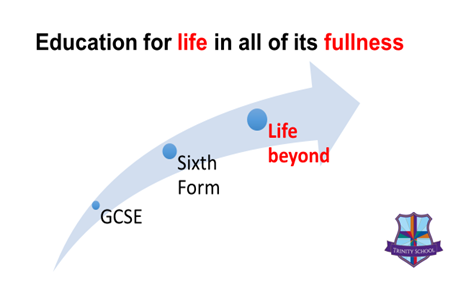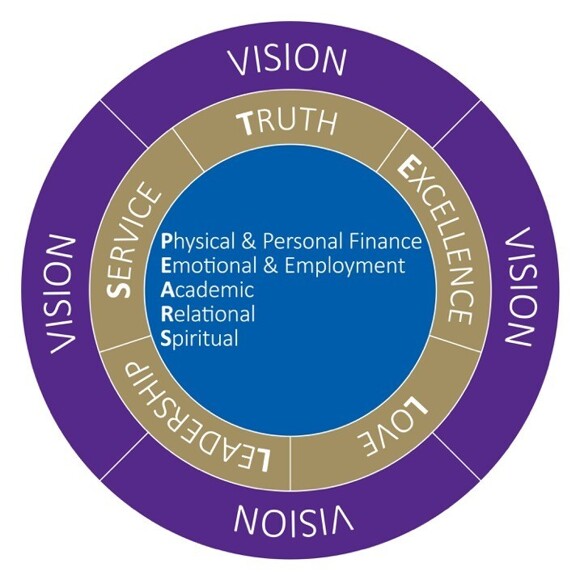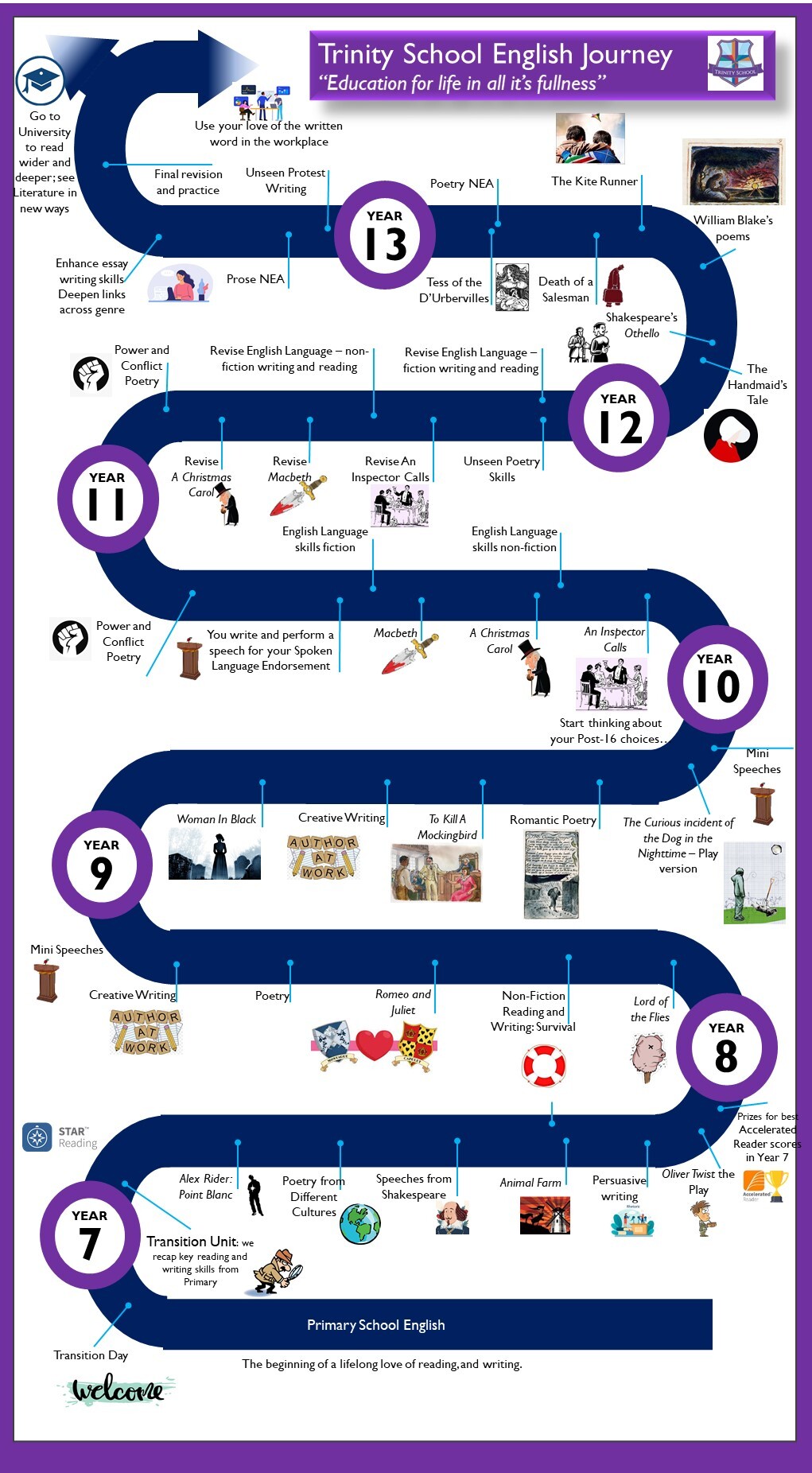Curriculum Intent
"The curriculum is ambitious and examination outcomes are particularly strong"
The curriculum reflects the school’s vision and ethos in the following ways:
- Every student knows they are loved and valuable to God
How? Examples include:
- A commitment to providing exceptional pastoral care
- A school in which students are known (e.g. birthday cards)
- Chaplaincy support (e.g. bereavement ministry)
- Every student to fulfil their God-given potential
How? Examples include:
- Strong teaching, which considers the individual needs of students.
- High behaviour expectations.
- We are aspirational for our students, with most following the same curriculum.
- We provide a range of opportunities (e.g., via our co-curricular programme, Bore Place), which allows us to identify and nurture the skills and talents of students.
- Adaptions made in 2021 and still reviewed because of the impact of Covid-19*.
- A broad and balanced curriculum designed to meet the needs and provide opportunities for students.
- Every student prepared to lead and serve
How? Examples include:
- Providing opportunities for students to practice their public speaking skills
- Class Ambassadors, Leadership Pathways Programme and Sixth Form Prefects
- Students taking part in the Service Programme, mentoring and supporting with clubs
Curriculum Principles (PEARS)
The aim of our curriculum is to provide each student an ‘Education for life in all its fullness’

A holistic education which includes academic success thereby empowering students beyond KS4 would be one aim. However, a Trinity education is broader and seeks to educate and provide learning opportunities, so students are equipped and can flourish across 7 key areas.

These areas are described below:
Physical |
Physical energy is the fundamental source of fuel… and lies at the heart of alertness and vitality but affects our ability to manage our emotions, sustain our concentration, think creatively, and even maintain our commitment to whatever mission we are on. (Loehr and Schwartz, 2009). |
|
How? Examples include:
|
Personal Finance |
Financial wellbeing matters because of its potential impact on other areas of our lives. |
|
How? Examples include:
|
Emotional |
Emotional health is about how we think and feel. It is about our sense of wellbeing, our ability to cope with life events. |
|
How? Examples include:
|
Employment |
Vocational wellness is the ability to achieve personal satisfaction and fulfilment from our work, maintain balance in our lives and make a positive impact within the organisations where we work and the communities where we live. |
|
How? Examples include:
|
Academic |
Academic wellbeing involves achieving one’s academic potential. To do this, students need to learn strategies and establish disciplines and habits that will help them to flourish in their studies without detriment to their health. |
|
How? Examples include:
|
|
*English example: In English, students study a range of texts and poetry for Literature, and they learn ways of expanding on their imaginations for Language. Our goal is to enable students to be fluent writers, readers, thinkers and communicators. By the end of year 9 students will be able to develop a thesis statement to engage with essay-based responses and provide detailed effects of methods. They will also be able to have solid analysis of language, structure and form using subject terminology. Students will be able to use register, tone and formality. They will have varied use of structural features for effect whilst using paragraphs coherently. They will be able to use a full range of linguistic devices and sophisticated vocabulary in their own writing. For GCSE English Literature, students study An Inspector Calls, Macbeth, A Christmas Carol and the AQA poetry anthology in the theme of Power and Conflict. Studying this variety encompasses many key skills that will enable students to become eloquent and effective readers and writers, as well as opens their eyes to Literature from different time periods. For GCSE English Language, students will study the way that words, punctuation, and the structure of a text can affect the way that readers feel and respond to them. They will also learn how to craft thought-provoking pieces of writing that aim to showcase their blossoming authorial skills. |

Relational |
Everything significant starts with relationships. Your faith, your family, your work, and your leadership are all based on how you relate. Your life is motivated by love for others, being part of a family, a desire for intimacy and vulnerability, choosing to work on a great team, and creating a product or service that helps others. ‘We are happiest when we know our lives revolve around people.’ (Townsend, 2019). |
|
How? Examples include:
|
Spiritual |
Spiritual Development Across the Curriculum At Trinity, we integrate spiritual development across the curriculum by embedding opportunities for reflection, curiosity, and wonder into all subjects. The Trinity Way serves as the framework guiding spiritual growth within various subjects and during tutor time. |
|
Click Here for a short video from Dr Pawson
|
Religious Education
Religious Education is a core subject at Trinity and given significant curriculum time from Year 7 to Year 11. Students acquire a deep understanding of Christianity, biblical literacy, church tradition and theology. Understanding of Christianity is taught alongside other world faiths in Key Stage 3, with a specific focus on Buddhism at Key Stage 4. Through Religious Education, students are taught to understand and evaluate beliefs, how they shape individuals and communities.
Inclusive Entitlement and Special Educational Needs and Disabilities
We believe that students should have full access to our rich curriculum; students with special educational needs and disabilities are fully included and experience academic success. This is central to the school’s vision. Learning is sequenced to remove unnecessary challenges and ensure knowledge is carefully built upon prior learning. Teachers focus upon overcoming barriers to learning and are supported by our SEND team, which allows as many students as possible to access the same curriculum.
Trinity Lifebites
Personal Social and Health Education, Relationship and Sex Education, Citizenship and SMSC are delivered through our Trinity ‘LifeBites’ programme, which occurs across subject areas and through regular tutor time activities. We have allocated the content to best reflect subject expertise. All students participate in core PE at Trinity, gaining skills and knowledge which support healthy lifestyles whilst at school and beyond. For more information please follow the below link Click Here
KS3 Offer
At Trinity School, every student, irrespective of starting point or individual learning needs, will be provided full access to the curriculum across all subjects.
Students in years 7 to 9 study the National Curriculum, which has been interpreted, designed and sequenced by subject experts to prepare students for their next steps.
Subjects such as Drama, whilst not forming part of the National Curriculum, are core parts of a weekly timetable for our students at key stage three as we understand how it contributes to the personal development of students in areas such as communication, empathy, discipline and emotional intelligence.
All students participate in the co-curricular programme, which boasts over 40 activities, such as Japanese club, chess, debating society, Duke of Edinburgh, Lego League, sign language club and Cooking on a budget (year 12).
Our curriculum is knowledge-rich and broad, which will enable students to excel, not only in public examinations, but beyond and into adult life.
|
English (Language and Literature) |
Mathematics |
Science |
Geography |
|
French or Spanish |
History |
Art |
Computer Science |
|
RE |
Drama |
PE |
Music |
|
DT |
Co-curricular |
Careers |
Trinity Lifebites (PSHE and RSE) |
More detail of the curriculum for each subject can be viewed on our Subjects page: Click Here
KS4 Offer
Students can choose from a wide range of subjects, which will equip and prepare them for the next stage in their education.
Details of the curriculum for each subject can be viewed on our Subjects page Click Here. A summary of the subjects available to KS4 students are outlined below.
|
English (Language and Literature) |
Mathematics |
Triple or combined science |
Geography |
|
French or Spanish |
History |
Art |
Computer Science |
|
RE |
Drama |
PE (core) |
Music |
|
DT |
Co-curricular |
Careers |
Trinity Lifebites (PSHE and RSE) |
|
Business |
Sport |
Photography |
Dance |
|
Product Design |
Food |
IT |
|
KS5 offer
An offering of predominately A-levels, gives students the opportunity to apply to the best universities or for the most competitive apprenticeships. A selection of vocational qualifications are available. Details of the curriculum for each subject can be viewed on our Subjects page Click Here. A summary of the subjects available to KS5 students are outlined below.
|
Art & Design |
Business |
Sociology |
Psychology |
|
Biology |
Physics |
Chemistry |
Maths and Further Maths |
|
Computer Science (from Sept 2024) |
English Literature |
History |
Geography |
|
CTEC Business |
CTEC IT |
Politics |
Philosophy and Theology |
|
Graphic Communications |
Music |
Drama and Theatre |
BTEC Sport |
|
Product Design |
French |
Film Studies |
Lecture Programme |
|
Careers |
Trinity Lifebites |
|
|
*Our response to Covid-19
|
2019-21 |
During lockdown, examples:
When we all returned, examples: In English, they created a transition unit, which recapped on basic KS2 grammar, punctuation, sentence construction etc. Delivered to year 7 (has been kept ever since due to effectiveness) for approx. 3 weeks In maths, they re-ordered units to teach e.g., Year 10 – Transformations The co-curricular programme facilitated time for students to come together having spent a considerable amount of time in isolation. |
|
Today |
Examples: We are in year 2 of a 3-year strategy to improve literacy across the school, particularly with year 8 and 9. Lexia has been used in tutor times to support with reading. In Year 9, sixth form reading mentors have been trained and utilised. The school’s literacy lead has also run a programme for students with the lowest reading ages to prepare them for KS4. Greater focus on attendance, particularly as it pertains to disadvantaged students. We have increased the number of days the school uses Team EWS (Education Welfare Services) from two to five days per week. Subject examples: In geography: knowledge around coursework at A-level is less secure and necessitates the re-teaching of certain elements of the GCSE specification. In MFL, the need to do more underpinning around key language structures happens. |


